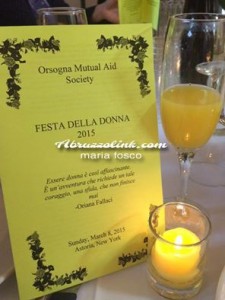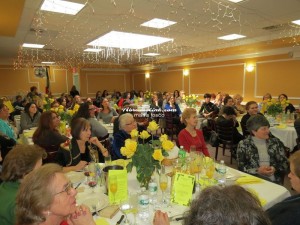Orsogna MAS Celebrates Festa Della Donna:
Orsognese Women Related in Blood and Friendship…and Beyond
On Sunday, March 8, 2015, the Orsogna Mutual Aid Society, the largest Abruzzese social club in New York celebrated its first Festa Della Donna in honor of International Women’s Day. In the Italian tradition of colors, the locale was draped in yellow and white linen. Yellow roses were seen at every angle in the room and yellow candles flickered through the stemware.
The afternoon was planned as a special event with a gourmet luncheon prepared by the male members of the association. It was an afternoon dedicated to the women members, their daughters, granddaughters, sisters, friends and co-paesane. It was an afternoon of “essere donna”. To share our memories, discuss our futures and live in the moment.
We are immigrants, children of immigrants, children of an adopted nation. We struggle on a daily basis, with our daily lives to assimilate and to understand the American system. A system that should by now have become simple to us, but yet hasn’t. At the same time, we struggle as women. We struggle to maintain our own identity; our own purpose in life. We struggle to maintain our families as our mothers and grandmothers did in Orsogna; to maintain our customs and traditions and teach our children our own heritage. We also need to transmit and demonstrate to our families that we must forge a future. That burden falls on us. It lies within us to be the powerbase of our society. We must also learn to depend on each other.
One particular phenomenon within the Orsognese community here in New York is the special bond between the women. Perhaps, it’s the tightknit community that was formed so many years ago. Maybe, the fact, that the early immigrants suffered through World War II together and then had the second injustice of having to emigrate to the United States en masse.
Our guest speaker for this afternoon’s event was Frank Mosca from Philadelphia. Frank immigrated from Orsogna in 1963 and settled in Philadelphia with his parents. Philadelphia was a stronghold for the Abruzzesi community during the early immigration period in the 19th and 20th centuries. Frank Mosca, a retired executive in the airline industry, had a wealth of knowledge on the Orsognese experience including immigration, language, literature and the Abruzzese community around the world. We asked him to speak and give his thoughts on Orsognese women and their special bond.
Frank discussed the special bond between three women, Maria Vincenza (Cinzelle), Italina and Emilia, three women from Orsogna who were related by blood and friendship. Maria Vincenza was Italina’s mother. Italina was a lifelong friend to Emilia, known as Miliette. It’s a story of how they loved one another, cherished, nourished and transmitted it to their children.
He talked about the most troublesome part of their lives, World War II “la uerre”, or for them, it was “Lu Sfullamente” (the forced evacuation) of Orsogna. Cinzelle and her family had to leave their home town of Orsogna to parts unknown as Abruzzo was ravaged by the war. They eventually found refuge in the “Open City” of Chieti. By the time the war was over and they returned to Orsogna, the conformable house that was built from the hard work and savings from their grandfather’s stay in Philadelphia was no more. There was “le macerie”, rubble. Pre-war Orsogna no longer existed.
Miliette was from Tollo, a “furastire, tullese”. She had move to Orsogna upon marriage to an Orsognese, Giovanni. Miliette and Giovanni settled in Mallorio, an area on the outskirts of Orsogna. Miliette, in need of medical attention, constantly visited the medical clinic across from Cinzelle’s home. The two struck a deep friendship. Cinzelle viewed her as the daughter she long lost years ago. Miliette saw Cinzelle as the mother she needed and Italina saw her as her lost sister. They established a lifelong friendship.
They shared stories of the war, of survival during the war and how they kept themselves alive after the war. They grew up in a world of women, where eventually, the men would leave to parts unknown to them: Argentina, Canada, Australia, Venezuela, etc… due to the economic breakdown of the Abruzzese economy after the war. They were the ones who stayed and maintained society.
Life would become as normal as one could expect for these women. It was all about rebuilding and providing mutual support for each other. The process was to rebuild homes, replant farmlands. To start anew.
In the following years after the war, both Miliette and Italina gave birth within 6 days of each other. Therefore, their friendship solidified even more. Their friendship was deep, even breastfeeding was exchanged, in order to cross-vitamize the infants…what one lacked, the other offered. In doing so, the infants became what are known as “fratelli di latte” an expression that is privileged in our culture.
Their devotion and affection between the families were demonstrated in many ways, whether it was planting favorite seeds, cooking a particular favorite dish, holidays, looking out for each other children’s welfare, or sharing harvest season. They assisted in keeping their traditions intact and participated in family rituals.
As years went on, times had changed. Their friendship never wavered. They talked, confided, cried together. They consoled each other and gave each other counsel. They worked and became heads of households when needed.
By the 1950’s immigration was at its height in the Abruzzo region and the women were forced to separate but the bonds remained. They did reunite when Italina, returned to Orsogna in the 1980’s and picked up where they left off. However, time did take its toll and unfortunately the women did pass on. Their children still keep in touch, always visit. The bonds were never broken, even until this day.
In conclusion of Frank’s talk, he emphasized the strength and the power of women in keeping a cohesive society by using their reliance on one another; their instincts, wisdom and self-assurance. On this Festa Della Donna, he reminded us that our ancestors, women of Orsogna, women of Abruzzo were the non-labeled feminists who taught us the strength in our relationships and how it transcended future generations. As women in a new world and a new generation, we can look back knowing how fortunate we were in having formidable women in our lives. We are still able to depend on each other and our relationships as Orsognese women to create a better life for ourselves and our families.
It was a subtle yet powerful message, that we, in an immigrant community have such a unique resource.








